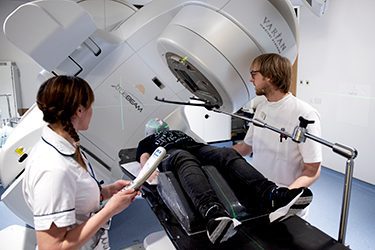A new plan has been published to improve radiotherapy services for cancer patients. The National Radiotherapy Plan for Scotland was welcomed by Health Secretary Humza Yousaf as he announced £1.5 million investment in specialised radiotherapy treatment.
This includes funding to increase the availability of Stereotactic ablative radiotherapy (SABR), a precise form of high dose radiotherapy generally used on small, well-defined tumours, which requires fewer sessions. The treatment limits the impact on surrounding organs to minimise adverse side effects.
Other actions include ensuring radiologist input within regional multidisciplinary cancer teams.
Mr Yousaf said:
“Radiotherapy plays a key role in treating and curing cancer, with approximately half of all cancer patients expected to receive radiotherapy treatment. After surgery, radiotherapy is the next most effective form of cancer treatment and is given to 40% of all patients who are cured.
“We are committed to providing a world class radiotherapy service for cancer patients, regardless of where they live. This National Radiotherapy Plan sets out 13 actions with a view to not only curing more cancers but also reducing side effects by increasing access to the most modern treatments.”
Dr John McLellan, Head of Radiotherapy Physics at Aberdeen Royal Infirmary said:
“SABR provides so many patients with treatment options that were not technically feasible just a few years ago and the team here in Aberdeen has worked hard to provide this cutting-edge technique for patients across the North East.
“We’re fortunate that consistent funding of radiotherapy equipment in Scotland has furnished our treatment centres with some of the most advanced equipment available. The funding being announced today will allow us to expand our SABR service in Aberdeen, meeting the challenges of ever more complex treatments and an ever increasing number of patients.”
Dr Stephen Harrow, Consultant Clinical Oncologist at the Edinburgh Cancer Centre, said:
“SABR is a potential treatment option for patients with limited metastatic disease. This funding provided by the Scottish Government is helping us to upscale the delivery of this treatment.“We have established a Scottish Oncology SABR Network which is enabling clinicians, physicists and radiographers involved in delivering this treatment across the five cancer centres to work collaboratively. The main aim of the network and the investment is to ensure that all Scottish patients have equitable access to this type of treatment and clinical trials.“Ultimately, we aim to strengthen inter-cancer centre links, share best practice, collect high quality national data, improve patient outcomes, and develop novel clinical trials for the Scottish population.”
The Plan is underpinned by ongoing investment as set out in the National Cancer Plan published last December, which includes £45 million for a procurement programme to ensure the most up-to-date radiotherapy equipment is available across Scotland’s cancer centres.
An investment of £1.2 million will be made to make SABR more readily available across all five cancer centres in Inverness, Aberdeen, Dundee, Edinburgh and Glasgow. SABR will treat Oligometastatic Disease – when the cancer has only a few, usually small growths that have spread beyond its origin point.
Background
Read the National Radiotherapy Plan for Scotland.
The Plan sets out a timeframe for each action to drive improvement and development of services, and ensure that progress is reviewed and maintained beyond the life of the plan which runs until March 2025.





